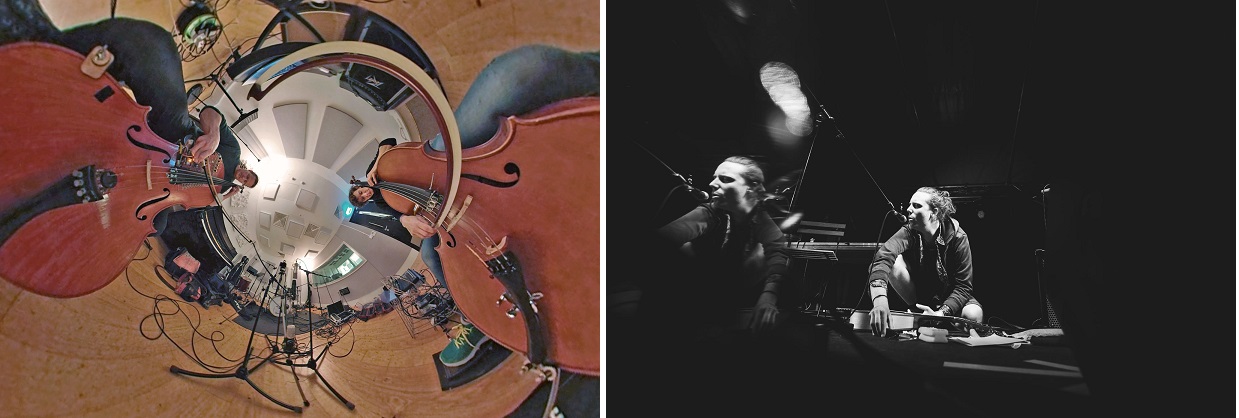 The concert will present three duos where the musicians will employ/utilise
The concert will present three duos where the musicians will employ/utilise
(self)-resonating feedback systems.
Set 1:
Phil Durrant – eBowed tabletop octave mandola and resonating objects
Richard Scott – eBowed tabletop mandolin and resonating objects
Set 2:
Luigi Marino – zarb, bowed cymbals, electronics
Mark Wastell – tam-tam, gongs, cymbals, objects
Set 3:
Alice Eldridge – feedback cello
Chris Kiefer – feedback cello
Set 1 will be the first performance of a new duo featuring Phil Durrant and Richard Scott who will ‘excite’ the strings of their mandolins with eBows but use objects to interfere with the resonances where sonic vulnerability is nurtured and exploited.
Set 2 will feature the ongoing collaboration between Luigi Marino and Mark Wastell. Their duo features metal instruments whose sustained oscillations are excited by beaters, bows, zarb and other objects.
Set 3 will feature Chris Kiefer and Alice Eldridge performing on hacked acoustic cellos, which are custom fitted with built-in speakers and on-body transducers, alongside analogue and digital processing. Thus the classical cello is transformed into a self-resonating feedback system.

Phil Durrant
Born near London in 1957, Phil Durrant is a multi-instrumentalist improviser/composer/sound artist who currently performs solo and group concerts.
As a violinist (and member of the Butcher/Russell/Durrant trio), he was one of the key exponents of the “group voice approach” style of improvised music. In the late 90s, his trio with Radu Malfatti and Thomas Lehn represented a shift to a more “reductionist” approach.
Recently, he has been performing solo and duo concerts with Phil Maguire, Bill Thompson, Mark Sanders, Lee Patterson and drone concerts with Mark Wastell, Phi Julian, Rhrodri Davies, Bill Thompson, using an analogue/digital modular synthesizer system. As a mandolinist, he has been performing with guitarist Martin Vishnick and a quartet with Sue Lynch, Hutch Demouilpied and Dave Fowler.
Durrant still performs regularly with the acoustic/electronic group Trio Sowari (with Bertrand Denzler and Burkhard Beins) and Mark Wastell’s The SEEN.
https://www.facebook.com/philsowaridurrant/
https://www.facebook.com/sowarimodular/
Richard Scott
Richard Scott is a musician and visual artist based in Birmingham with interests in pattern, liminality and varying modes of perception and control. He is mainly active as an improviser and has performed and recorded throughout the UK and in France and Switzerland. He has a long-standing duo, Ergod, with Swiss alto player Tapiwa Svosve and has played recently with Silvan Schmid, Eddie Prévost, Phil Durrant, Mark Sanders, Rachel Musson, Sarah Farmer, Andrew Woodhead, Aaron Diaz, Joe Wright, James Malone and Samuel Rodgers. He also plays Scandinavian folk music for dance and makes abstract drawings.
http://richard-md-scott.tumblr.com/
Luigi Marino
Luigi Marino is a musician based in London. His work focuses on networks able to display relationships between human and nonhuman actors, with particular attention to how intuitive decisions can profoundly affect pre-existing conditions. He is an active improvisor performing on both electronic media and percussion, especially zarb and bowed custom cymbals.
Besides Uccello Acquatico, he regularly performs solo, in duo with Michael Thieke and Mark Wastell, in trio with Giancarlo Schiaffini and Eugenio Colombo, and with both Mark Wastell and Phil Durrant in the former’s large ensemble THE SEEN.
http://www.luigimarino.net/
Mark Wastell
Mark Wastell has been active as a musician since 1995, making his initial concerts with the trio IST featuring Rhodri Davies and Simon H. Fell. He has performed and recorded extensively and has collaborated with the likes of Derek Bailey, John Butcher, Evan Parker, Lasse Marhaug, John Tilbury, Mattin, Mark Sanders, Tony Conrad, Tim Barnes, Bernhard Günter, Keith Rowe, John Zorn, Peter Kowald, Joachim Nordwall, Otomo Yoshihide, Burkhard Beins, Paul Dunmall, David Toop, Alan Wilkinson, Max Eastley, Hugh Davies, Julie Tippetts, Alan Skidmore and David Sylvian.
Mark also runs the Confront Recordings record label.
Alice Eldridge and Chris Kiefer
Feedback Cell is the experimental luthiary and performance project of Chris Kiefer and Alice Eldridge. Feedback cellos are hacked acoustic cellos, custom fitted with built-in speakers and on-body transducers, analogue and digital processing; the classical cello is transformed into a self-resonating feedback system. The feedback cello is thoroughly lively; playing is a process of negotiating dynamic resonant forces rather than actuating and controlling more or less passive strings of its classical ancestor. Sonically, the cellos conjure a new soundscape, arising from collision of their hybrid components: dulcet, resonant drones, palpably compressed overtones and spectral over-driven screams of digitally-transformed, physically-filtered Larsen tones.
Feedback Cell began with a conversation between Alice and instrument designer Halldor Ulfarsson, asking whether the feedback techniques which characterise his instrument, the Halldorophone, could be applied to acoustic cellos. The answer was “Let’s try”. In close collaboration with Halldor, the instruments were built in the summer on 2016, fitting speakers, transducers and pickups to two standard cellos for a workshop as part of International Conference of Live Interfaces, 2016. Since 2016, Alice and Chris have been exploring and developing these instruments through iterative upgrades and frequent performances both as a duo and with other artists. They have made regular invited appearances at key formal and informal computer music, improvised and experimental music events around Europe including: xCoAx Bergamo, Italy, 2016; Fete QuaQua, London, 2016; Brighton Alternative Jazz Festival, 2016; Mengi, Reykjavik, 2017; Loop Berlin 2017; EarZoom Festival, Ljubljana, 2017; ICLI Porto, 2018; Fort Process, UK, 2016 and 2018; The Seen Brighton and London, 2018.

